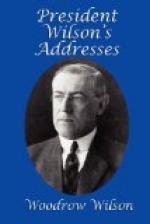It is inconceivable that the people of the United States should play no part in that great enterprise. To take part in such a service will be the opportunity for which they have sought to prepare themselves by the very principles and purposes of their polity and the approved practices of their Government ever since the days when they set up a new nation in the high and honorable hope that it might in all that it was and did show mankind the way to liberty. They cannot in honor withhold the service to which they are now about to be challenged. They do not wish to withhold it. But they owe it to themselves and to the other nations of the world to state the conditions under which they will feel free to render it.
That service is nothing less than this, to add their authority and their power to the authority and force of other nations to guarantee peace and justice throughout the world. Such a settlement cannot now be long postponed. It is right that before it comes this Government should frankly formulate the conditions upon which it would feel justified in asking our people to approve its formal and solemn adherence to a League for Peace. I am here to attempt to state those conditions.
The present war must first be ended; but we owe it to candor and to a just regard for the opinion of mankind to say that, so far as our participation in guarantees of future peace is concerned, it makes a great deal of difference in what way and upon what terms it is ended. The treaties and agreements which bring it to an end must embody terms which will create a peace that is worth guaranteeing and preserving, a peace that will win the approval of mankind, not merely a peace that will serve the several interests and immediate aims of the nations engaged. We shall have no voice in determining what those terms shall be, but we shall, I feel sure, have a voice in determining whether they shall be made lasting or not by the guarantees of a universal covenant; and our judgment upon what is fundamental and essential as a condition precedent to permanency should be spoken now, not afterwards when it may be too late.
No covenant of cooeperative peace that does not include the peoples of the New World can suffice to keep the future safe against war; and yet there is only one sort of peace that the peoples of America could join in guaranteeing. The elements of that peace must be elements that engage the confidence and satisfy the principles of the American governments, elements consistent with their political faith and with the practical convictions which the peoples of America have once for all embraced and undertaken to defend.




